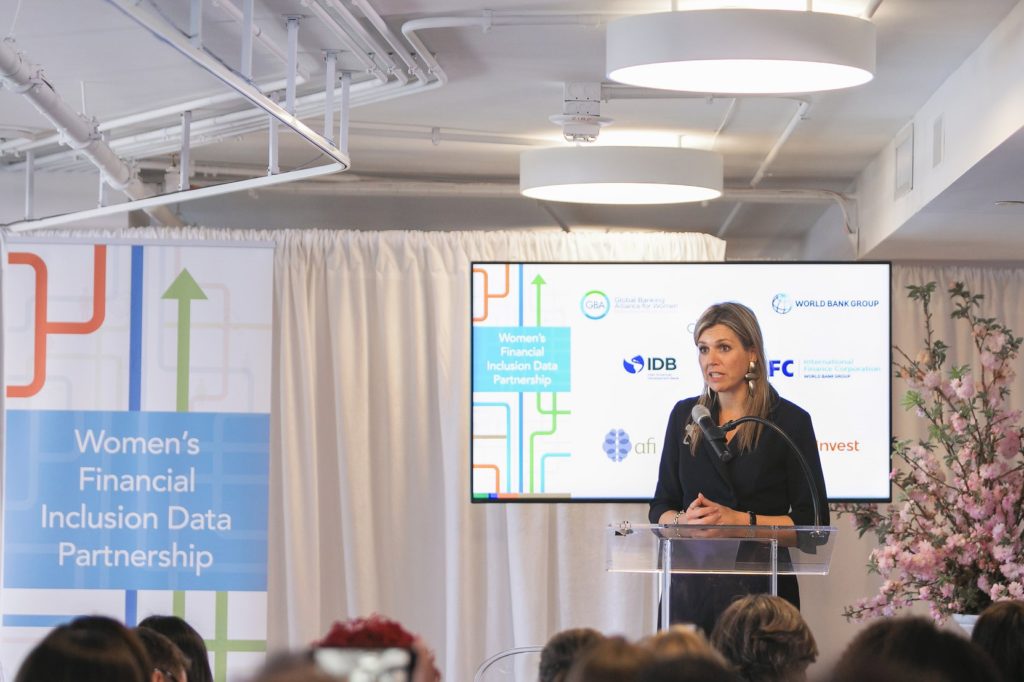This year marks the tenth anniversary of Her Majesty Queen Máxima of the Netherlands’ appointment as the UN Secretary-General’s Special Advocate for Inclusive Finance for Development (UNSGSA).
As the UNSGSA, H.M. Queen Máxima has been instrumental in advocating for more and better gender data for expanded access to financial services. In this vein, her support for the case made by Data2X’s Women’s Financial Inclusion Data Partnership — achieving women’s financial inclusion through gender data — has been critical in working toward sustainable development progress, economic stability, and inclusive business opportunities for financial institutions.
That’s why, alongside the 74th UN General Assembly (UNGA) this week, we are thrilled to join the global community in celebrating and thanking the Special Advocate for her work; no one has been a stronger voice on the value and importance of gender data for financial inclusion.

H.M. Queen Máxima, the UNSGSA, has made a clear case for the necessity of gender data as a diagnostic tool to drive concrete action to improve the lives of the financially excluded, particularly women. She has combined that push for gender data with stories of lived experiences and clear action steps for decision makers. This approach has had a significant impact on financial inclusion.
The UNSGSA seeks to increase data-driven decision-making through better data collection and use. Her focus on improving gender data enables better decisions for women’s financial inclusion.
For example, her partnership on the World Bank’s Global Findex — the key demand-side database that captures headline gender gaps in financial inclusion — has encouraged national governments to create policies to expand inclusive finance for women.
Additionally, her advocacy around the International Monetary Fund (IMF)’s Financial Access Survey (FAS) — the global supply-side dataset on financial access and use — has encouraged countries to collect and report sex-disaggregated data for inclusion in the FAS. As a result, more countries are reporting on this critical gender data, which is necessary for understanding how women are served once they have gained access to the formal financial system.
The UNSGSA’s emphasis on data’s impact when used — not just data collection — should also be recognized. Stories that demonstrate positive impact resulting from the use of financial inclusion gender data can encourage other countries to collect and use this data.
Through her high-level platform, she consistently highlights countries where gender data-driven decisions are being made, and the impact of these decisions.
For example, in the UNSGSA’s remarks at a G20 Leaders’ Summit Side Event on Women’s Empowerment in Osaka, Japan, she shared the success story of Mexico, where, after disaggregated data showed there was a gap in retirement savings between men and women, the government created retirement savings programs aimed at women to close that gap. Those programs, born out of good data collection and use, now aim to reach 2.4 million women.
Lastly, one of the hallmarks of the UNSGSA’s work has been clear calls to action to the various stakeholders who influence how data is collected and used for impact.
From her recent requests for countries to report gender data to the IMF Financial Access Survey, to asking global data collectors to produce key relevant indicators for women’s financial inclusion, to encouraging the private sector to use data to develop gender-responsive financial products—her substantive and distinct calls-to-action are a trademark of her high-level platform’s efficacy.
We congratulate the UNSGSA and her team on this critical work; the much-deserved anniversary celebration at UNGA this week is a stellar reminder of the power of leaders to affect change at the local, national, and global level. Her work demonstrates the importance of high-level champions for gender data — and how these champions can use their platforms to drive real change.
We urge more high-level champions — including those in government, civil society, and the private sector — to use their unique voices, convening platforms, and influence to support gender data, for the ultimate goal of achieving women’s financial inclusion and bettering the lives of all.
As we like to say at Data2X, “gender data pays.”
